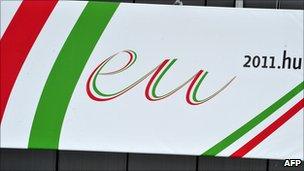Under fire Hungary media watchdog raises concerns
- Published

Hungary took over the EU presidency at the same time its new media law entered into force
Hungary's new media authority has begun investigating a radio station for playing a song by rapper Ice-T which it said "could influence the development of minors in a negative way".
The authority came into being on Saturday, at the same time as Hungary assumed the six-month EU presidency.
The new media law can also require journalists to reveal their sources on matters of national security.
It has been criticised by rights groups and questioned by the UK and Germany.
The Tilos radio station said it was being investigated by the National Media and Communications Authority, the NMHH, for playing the song, Warning, it's On, by Ice-T at 1730 local time.
The NMHH said the song should only have been broadcast after 2100.
Concerns
The Organisation for Security and Co-operation in Europe (OSCE) said, external the new law "endangers editorial independence and media pluralism".
It said the new law leaves key terms undefined, including the "protection of public order", which - if violated - requires journalists to reveal their sources.
All five members of the media authority, the NMHH, are members of or are linked to the Fidesz party of Hungarian Prime Minister Viktor Orban.
Mr Orban has defended the new law, saying it does not contain any measures not already in force in other EU member states.
Under the new law, broadcasters and newspapers can be fined up to 200m forints (£615,000; $955,000) for violating "public interest, public morals or order".
Britain and Germany have both urged Hungary to clear up concerns about the law.
"Freedom of the press is at the heart of a free society," said a spokesperson for the UK Foreign Office, external.
"We hope that the Hungarian Government will soon resolve this issue satisfactorily and that it will not impact adversely on the successful delivery of the Hungarian EU Presidency."
And deputy German foreign minister Werner Hoyer told the Frankfurter Rundschau newspaper, external: "We must rigorously ensure that fundamental rights are protected in the European Union beyond any doubt. Press freedom is one of those rights. If it is questioned, that must be resolved."
- Published21 December 2010
- Published2 December 2010